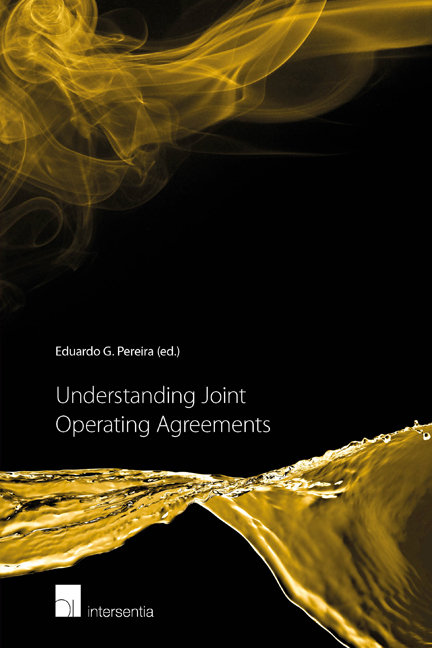Book contents
- Frontmatter
- Contents
- List of Abbreviations
- List of Authors
- Introduction
- PART I CONSIDERATIONS PRIOR TO ENTERING INTO A JOA
- 1 Bribery Laws and Compliance
- 2 The Relationship with Other Joint Venture Agreements
- 3 Unitisation and Unit Operating Agreements
- 4 Key Issues Relating to JOAs in Civil Law Countries
- 5 The Relationship between a JOA and a Host Government Instrument
- 6 Decommissioning Obligations, Practices and Procedures
- 7 Standards and Practices in JOAs across the Petroleum Industry
- 8 Modifying the Standard JOA to Accommodate Unconventional Petroleum Projects
- PART II SETTING UP A JOA
6 - Decommissioning Obligations, Practices and Procedures
from PART I - CONSIDERATIONS PRIOR TO ENTERING INTO A JOA
Published online by Cambridge University Press: 15 December 2017
- Frontmatter
- Contents
- List of Abbreviations
- List of Authors
- Introduction
- PART I CONSIDERATIONS PRIOR TO ENTERING INTO A JOA
- 1 Bribery Laws and Compliance
- 2 The Relationship with Other Joint Venture Agreements
- 3 Unitisation and Unit Operating Agreements
- 4 Key Issues Relating to JOAs in Civil Law Countries
- 5 The Relationship between a JOA and a Host Government Instrument
- 6 Decommissioning Obligations, Practices and Procedures
- 7 Standards and Practices in JOAs across the Petroleum Industry
- 8 Modifying the Standard JOA to Accommodate Unconventional Petroleum Projects
- PART II SETTING UP A JOA
Summary
The focus and approach of oil and gas sector participants in relation to decommissioning (or abandonment, as it was referred to historically) has notably evolved in some correlation with the general maturity of the sector. A consequence of some of the world ‘ s significant basins reaching maturity (characterised by flows from existing assets tailing off and new discoveries being few (or at least less significant)), is an increasing focus on decommissioning by concessionaires, governmental policy makers and those who see commercial opportunity in the business of decommissioning. Decommissioning security and costs have become key factors in oil and gas development, financing and asset transactions in the more mature oil and gas basins around the world. An as example of the scale of future decommissioning, on the United Kingdom Continental Shelf (UKCS) there are more than 600 off shore oil and gas installations, more than 10,000 km of pipelines, and around 5,000 wells and accumulations of drill cuttings. Associated with these are also 15 onshore terminals. DECOM North Sea forecasts that decommissioning such North Sea oil and gas facilities is projected to cost between £ 30bn and £ 35bn between 2010 and 2040.
In comparison to oil and gas exploration, as a business, decommissioning in the oil and gas sector is relatively new. As a concern, however, the requirement to decommission has arguably always existed and was properly enshrined in international law by the United Nations Convention on the Law of the Sea 1982 (UNCLOS). The burden of the requirement to decommission and of the issues associated therewith typically manifests when a basin reaches a level of maturity which results in a shift in the characteristics of the participants. From an analysis of mature basins, such as the UKCS, it is evident that maturity gives rise to a move away from large multinational companies holding a significant portfolio of producing assets with significant reserve profiles and strong financial covenant to the entry of smaller, independent, less creditworthy companies with small or single-asset portfolios in which the assets have limited time remaining in their respective lifecycles.
- Type
- Chapter
- Information
- Understanding Joint Operating Agreements , pp. 95 - 108Publisher: IntersentiaPrint publication year: 2016



